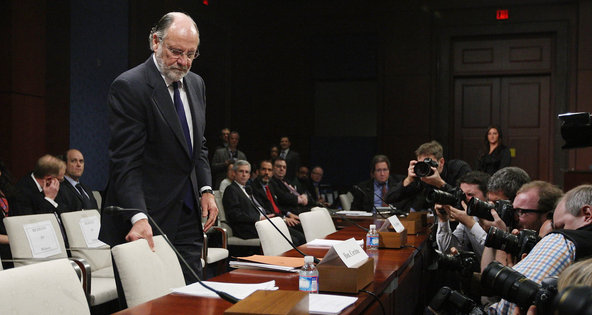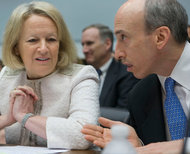 Alex Wong/Getty ImagesJon Corzine, the former chief of MF Global, at a House panel in 2011.
Alex Wong/Getty ImagesJon Corzine, the former chief of MF Global, at a House panel in 2011.
2:52 p.m. | Updated
WASHINGTON – Congressional Republicans on Thursday delivered a long-awaited “autopsy” report on MF Global, sharply criticizing regulators for failing to share information as the brokerage firm was reeling.
The 100-page report, from Republican members of the House Financial Services Committee’s oversight panel, describes a “disorganized and haphazard” approach to regulatory oversight in the week before MF Global collapsed in 2011. The Commodity Futures Trading Commission and the Securities and Exchange Commission, according to the report, failed to coordinate as the firm was on the brink.
Two days before the collapse of the firm, top S.E.C. officials joked about three conference calls among regulators being scheduled for 10 a.m. “Ahhhh, coordination in action!” Mary L. Schapiro, chairwoman of the S.E.C., wrote in an e-mail to Robert W. Cook, the agency’s head of trading and markets.
Related Links
 Documents: Reports on MF Global’s Bankruptcy
Documents: Reports on MF Global’s Bankruptcy- Report Blames Corzine for MF Global’s Fall (Nov. 14, 2012)
In the final hours before bankruptcy, the report said, MF Global officials said the futures commission “pressured” the firm to transfer $220 million to plug a hole in customer accounts. It did so over the objections of the S.E.C. and other regulators. When Ms. Schapiro learned of the futures commission’s orders, she responded in an e-mail to a colleague, “Without telling us? That is unacceptable.”
The e-mails underscored the breakdown in communication among federal officials that, according to the report, contributed to the firm’s demise. The report also took aim at the Federal Reserve Bank of New York, saying it “should have exercised greater caution” when approving MF Global’s application for the coveted status of selling securities on the Fed’s behalf.
Lawmakers suggested that investors and customers would have been better served if the S.E.C. and the futures commission streamlined their operations or combined into a single agency that oversaw all capital markets, citing “an apparent inability” of the regulators to coordinate their actions.
 Daniel Rosenbaum for The New York TimesMary L. Schapiro, chairwoman of the Securities and Exchange Commission, and Gary Gensler, chairman of the Commodity Futures Trading Commission, before a House panel in June.
Daniel Rosenbaum for The New York TimesMary L. Schapiro, chairwoman of the Securities and Exchange Commission, and Gary Gensler, chairman of the Commodity Futures Trading Commission, before a House panel in June.
“We didn’t need additional regulation. We needed regulators actually doing their job,” Representative Randy Neugebauer, a Republican from Texas who led the investigation as chairman of the oversight panel, said at a news conference on Thursday.
Futures commission officials declined to comment. John Nester, a spokesman for the S.E.C., said his agency would review the panel’s findings. He added that the report did not mention the S.E.C.’s having informed the C.F.T.C. about capital charges imposed on MF Global in August.
The report, a sort of public shaming of MF Global’s employees and federal watchdogs, further traced the debacle to the firm’s top executives. Republicans placed blame on the former chief executive, Jon S. Corzine, who they say ratcheted up a bet on European debt without regard for internal controls or the danger to clients. The report also argued that the firm was not “forthright with regulators or the public” about the massive trade and its broader health.
Republicans released the report months later than anticipated and without the support of House Democrats.
Some dissent was sowed in Congressional hearings that at times featured political bickering among members. On Wednesday, the oversight panel’s top Democrat, Representative Michael Capuano of Massachusetts, declined to endorse Mr. Neugebauer’s findings, saying he agreed with a number of the conclusions but needed additional time to review the document. He said he would soon file an addendum to the report.
For the targets of the report, the splintered support provides a path to undermining the findings. Democratic regulators and Mr. Corzine, a former Democratic senator from New Jersey, could dismiss the investigation as a partisan attack.
House Republicans, however, say the examination relied on an exhaustive review of evidence rather than political motivations.
The report, the outgrowth of several Congressional hearings with MF Global’s executives and other officials, is the culmination of a yearlong investigation that sought to chronicle the firm’s undoing and rebuke those at fault. The House panel cobbled together its findings from dozens of interviews with former employees and more than 240,000 documents.
While short on revelations, the document is the most significant Congressional effort yet to seek redress for MF Global’s errors.
Criminal authorities investigating MF Global’s collapse are leery of filing charges against the top executives, suspecting that chaos and lax controls resulted in customer money going missing. And while regulators are still pursuing civil enforcement actions, in which the legal bar is lower, officials have not yet decided a course.
Even after a year of overlapping investigations, MF Global’s customers remain in the lurch. Farmers and ranchers, who traded futures contracts through MF Global to protect themselves from the price swings of their crops, have recovered about 82 percent of their money but are still owed millions of dollars.
James W. Giddens, the court-appointed trustee seeking to recover money for MF Global’s customers, has joined a lawsuit against several top MF Global executives, including Mr. Corzine, to make up for the missing funds.
In a report that largely tracks the findings issued by Congressional Republicans, Mr. Giddens criticized MF Global employees for tapping customer money to pay the firm’s own bills in a last-ditch bid for survival.
Article source: http://dealbook.nytimes.com/2012/11/15/house-report-details-collapse-of-mf-global/?partner=rss&emc=rss
